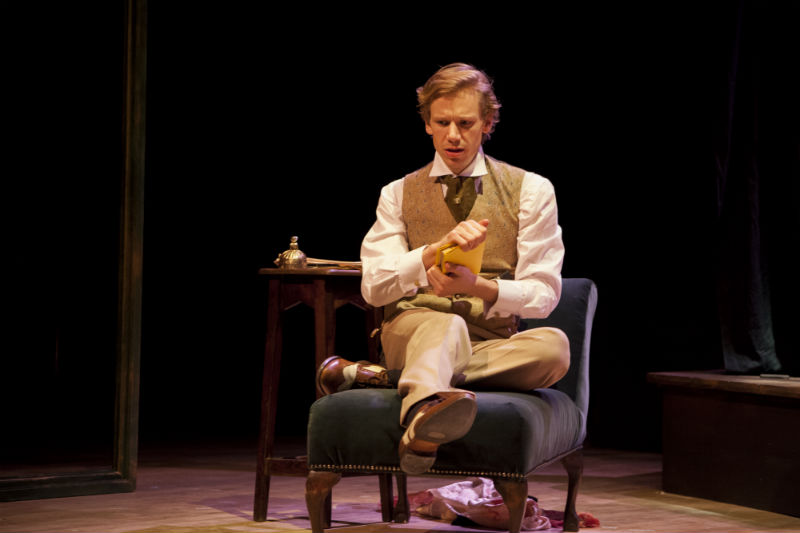@ Brunton Theatre, Musselburgh, on Thu 30 Apr 2015 and
@ Swallow Theatre, Whithorn, on Mon 4 May 2015
This is Oscar Wilde’s only novel turned into a play by his grandson Merlin Holland and John O’Connor. It’s a ‘gay play’ (the Stonewall logo is on the flyer) although that word is never mentioned as this is Victorian London, replete with pea souper fog supplied from stage right.
It’s difficult to feel much sympathy for the tormented toffs and downtrodden cockneys, and the extravagant swirl of Wilde’s famous plays like The Importance of Being Earnest are but a shadow in this gothic chamber piece. The story of the beautiful man (Guy Warren-Thomas) who sells his soul in exchange for eternal youth should ring true in our world of self-obsessed narcissism. His admirers Sybil (Helen Keeley), Lord Henry (Gwynfor Jones channelling Stephen Fry right down to the velvet smoking jacket) and Basil (the excellent Rupert Mason) do sterling work to bring the story alive. There are 21 characters in the play and only four actors and it’s a trick that’s pulled off seamlessly, thanks largely to director Peter Craze. Lord Henry is a good reminder of Wilde’s genius with epigrams, although these become as tiresome as the utterances of a talking doll.
It is a mark of its enduring currency that the Dorian Gray story has entered the language. Who wouldn’t love to have a portrait in a locked attic that aged while you remained, like the fashion store, Forever 21? As with most pacts with the devil, of course, this is Not A Good Idea. And so it proves for Mr Gray as the painting not only ages but becomes grotesque, starting with a touch of cruelty around the mouth reflecting the sinning, corrupted Gray as his troubled soul becomes the ruination of him.
The story was very effectively reinvented as a ballet by Matthew Bourne, updated with paparazzi and cocaine. But here it’s unfortunately rooted in cobwebby Victoriana and although effective in places, notably Matt Eaton’s sound design, it’s more creaky than creepy. As Wilde might have said, it’s not so much that a play such as this is done well as it is done at all. The very things that the play hints at are made oddly quaint when in the real world there is a fierce, self-centred youth culture, the horrors of body dysmorphia, and where ‘sexual minorities’ are fully accepted (mostly). Oscar, darling, the world’s moved on.
